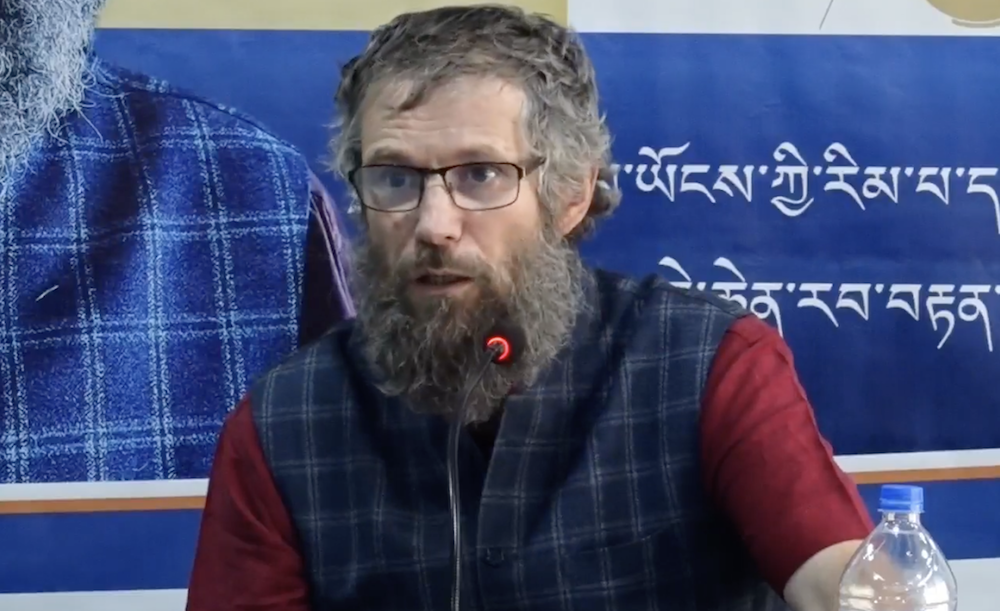By Tsering Dhundup
DHARAMSHALA, Oct. 23: Nicolas Tournadre, a French linguist and professor at the University of Provence, specializing in morphosyntax and typology urged Tibetan youth to learn their native language to access their rich Tibetan traditions and philosophy. He was speaking at a public event organised by Tibet Times media outlet, titled “Debate on the Depth of Tibetan Language Tradition and International Linguistics” at Hotel Tibet, Dharamshala on Sunday.
Tournadre is an expert in Tibetic languages and recently co-authored a book titled “The Tibetic Languages: An Introduction to the Family of Languages Derived from Old Tibetan” with Hiroyuki Suzuki, who specializes in Kham languages. His connection with Tibet dates back to 1985 when he first arrived in Dharamshala, followed by a visit to Tibet in 1988. During these visits, he learned Tibetan under the guidance of Gen Sangda Dorjee, Bawa Kalsang Gurmey, and Bawa Phuntsok Wangyal.
In his presentation, Tournadre discussed the closure of Tibetan schools in Sichuan provinces, with a specific focus on Kardze, underlining the lack of freedom in Tibet due to Chinese occupation. He expressed concern about the use of Mandarin as the medium of instruction in Tibetan schools, which poses a risk to the preservation of the Tibetan language. However, he also conveyed optimism that the language could endure.
Tournadre pointed out that the Tibetan language, with its historical and religious significance, is unlikely to diminish. He drew parallels with the Hebrew and Armenian languages, both of which faced periods of loss but later experienced revitalization. Hebrew, lost for 2000 years, is now spoken by 8 million people worldwide, while the Armenian language, suppressed for hundreds of years under Turkish occupation, has seen a resurgence with 5.3 million speakers globally. Tournadre highlighted that the common factors among these languages are their antiquity, written manuscripts, and strong connections to religion.
Additionally, Tournadre mentioned the existence of 308 regional languages in Tibet, with Tibetan being the primary language of use. He took pride in the fact that out of the 7,000 languages worldwide, only 30 are commonly spoken, and among them, 15 are over a thousand years old, with standard Tibetan being one of them at 1300 years old.











3 Responses
Some Tibetans were having communion with interstellar entities in far away galaxies from central tibet, espcially mt Kailash. The language might have partly come from outer space. The sheer number of incorporeal entities roaming in Tibetan plateau and meteriods and dzi beads of unknown origian is beyond conception of current human science as we know it. There are shamans from Tibet who travel to 4th dimension and changes weather and bring storms and hurricans etc, as in the story of famous Milarepa the saint. The richness of Tibetan language can be seen from the way of Tibetan life which appears simultaneously to live in three or four layers, and perfectly at ease in the body. Look closely into eyes of some Tibetans, and it is evidence that there is some brain waves that appear to come from outer space. if alien invasion, or ww3 happens, only Tibet people can save the earth. Sometimes a whole society can go into mass psychosis, like dance ritual in nightclubs where logic is suspended temporarily. But when such mass madness occurs, it can spin a whole village out of control. in such a situation, only highly realized beings with access to higher dimensions, such as rishis of antient india and shamas of tantric buddhism can come to help. modern science have shut down churches in europe to make way for secular, rational societies but true consequences of such so-called enlightenment movement is not yet fully known. Western scientists have assumed planet earth as a key player in the universe, but real situation is we are just a small ant colony near a tree in a small remote village. our real concern as humanity is invasion from outer space. humans are just one people despite our little differences and little wars.
bro, Tibetans feel white people are superior to them. That’s why.
Tibetan scholars and academics of the Tibetan language have been saying this for the past twenty years. Even our teachers in Tibetan schools in exile have been repeating this mantra for a while. Yet Phayul chooses to give space to a Non-Tibetan scholar of the Tibetan language.
Find it strange that the same message delivered by a Non-Tibetan, especially a Westerner, is considered to be of more value than that of a fellow Tsampa Eater. Maybe we should start according the same respect and esteem to the research endeavors of Tibetan scholars of the Tibetan language.
We have dozens if not hundreds of extremely capable and highly qualified Tibetan scholars, intellectuals, and academics in exile who are publishing great research on the Tibetan language and literature. Maybe we should start covering them and their research.
While I appreciate the work of Dr. Tournadre, I think we Tibetans are in danger of losing the control over the academic discussions and debate over our mother tongue to foreigners. This has already happened to some extent with Buddhism and Tibetan “Art”. We should not let Non-Tibetans become the face and the voice of the Tibetan language to the rest of the world. Especially, when we have, probably, even more qualified Tibetans than Dr. Tournadre.